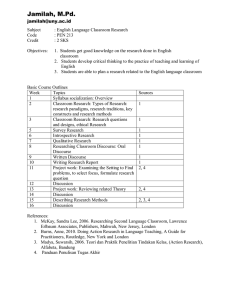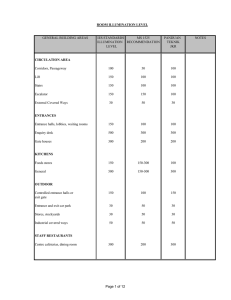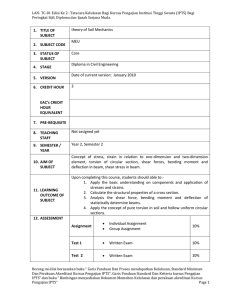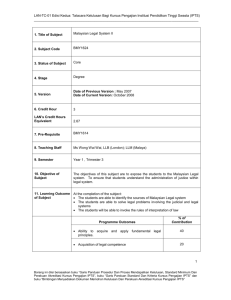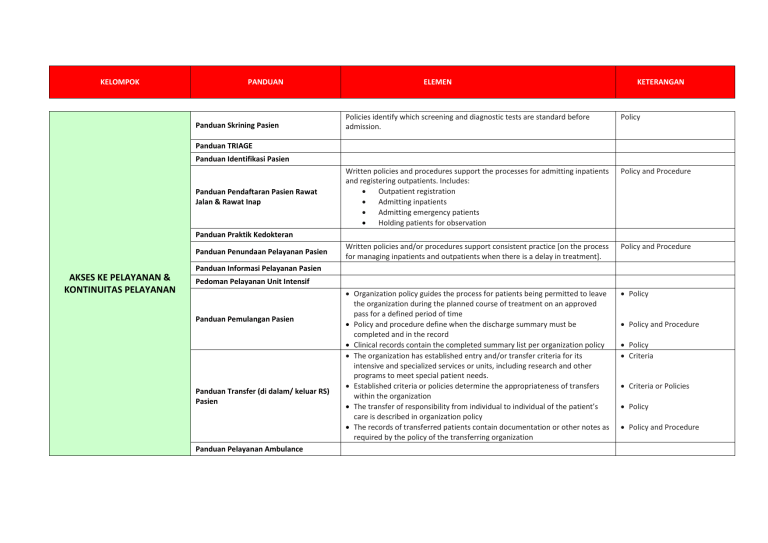
KELOMPOK PANDUAN Panduan Skrining Pasien ELEMEN KETERANGAN Policies identify which screening and diagnostic tests are standard before admission. Policy Written policies and procedures support the processes for admitting inpatients and registering outpatients. Includes: Outpatient registration Admitting inpatients Admitting emergency patients Holding patients for observation Policy and Procedure Written policies and/or procedures support consistent practice [on the process for managing inpatients and outpatients when there is a delay in treatment]. Policy and Procedure Organization policy guides the process for patients being permitted to leave the organization during the planned course of treatment on an approved pass for a defined period of time Policy and procedure define when the discharge summary must be completed and in the record Clinical records contain the completed summary list per organization policy The organization has established entry and/or transfer criteria for its intensive and specialized services or units, including research and other programs to meet special patient needs. Established criteria or policies determine the appropriateness of transfers within the organization The transfer of responsibility from individual to individual of the patient’s care is described in organization policy The records of transferred patients contain documentation or other notes as required by the policy of the transferring organization Policy Panduan TRIAGE Panduan Identifikasi Pasien Panduan Pendaftaran Pasien Rawat Jalan & Rawat Inap Panduan Praktik Kedokteran Panduan Penundaan Pelayanan Pasien AKSES KE PELAYANAN & KONTINUITAS PELAYANAN Panduan Informasi Pelayanan Pasien Pedoman Pelayanan Unit Intensif Panduan Pemulangan Pasien Panduan Transfer (di dalam/ keluar RS) Pasien Panduan Pelayanan Ambulance Policy and Procedure Policy Criteria Criteria or Policies Policy Policy and Procedure KELOMPOK PANDUAN Panduan Kebutuhan Privasi dan Perlindungan Harta Panduan Perlindungan terhadap Kekerasan Fisik Panduan Penolakan Tindakan (Resusitasi) dan Pengobatan Panduan Menanggapi Keluhan ELEMEN KETERANGAN Policies and procedures support consistent practice [on resuscitative practices]. Policies and procedures support consistent practice [in the complaint process]. Policy and Procedure Policy and Procedure Panduan Donor Organ Policies and procedures guide and support patient and family rights in the organization. Policies and procedures are developed to support and to promote patient and family participation in care processes. Policies and procedures address the patient’s right to seek a second opinion without fear of compromise to their care within or outside the organization. Policies and procedures support consistent practice [on resuscitative practices]. The organization has a clearly defined informed consent process described in policies and procedures. The organization has listed those procedures and treatments that require separate consent. Policies and procedures guide the information and decision process [for research]. Policies and procedures guide the procurement and donation process. Panduan Transplantasi Policies and procedures guide the transplantation process. Policy and Procedure Policy and Procedure Panduan Pelayanan Kerohanian Pasien HAK PASIEN & KELUARGA Panduan Perlindungan Hak Pasien dan Keluarga Panduan Tantang Bantuan Hidup Dasar Panduan Persetujuan Tindakan Kedokteran Panduan Informasi Pelayanan Policy and Procedure Policy and Procedure Policy and Procedure Policy and Procedure Policy and Procedure KELOMPOK ASESMEN PASIEN PANDUAN Panduan Asesmen Pasien : a. Asesmen Medis b. Asesmen Keperawatan c. Asesmen Nutrisi d. Asesmen Nyeri ELEMEN Organization policy and procedure define the assessment information to be obtained for inpatients. Organization policy and procedure define the assessment information to be obtained for outpatients. Organization policy identifies the information to be documented for the assessments. The minimum content of assessments performed in inpatient settings is defined in policies. The minimum content of assessments performed in outpatient settings is defined in policies. All inpatients and outpatients have an initial assessment(s) that includes a health history and physical examination consistent with the requirements defined in hospital policy. Policies and procedures support consistent practice in all areas [related to identifying patient medical and nursing needs]. The initial medical assessment is conducted within the first 24 hours of admission as an inpatient or earlier as indicated by the patient’s condition or hospital policy. The initial nursing assessment is conducted within the fist 24 hours of admission as an inpatient or earlier as indicated by the patient’s condition or hospital policy. The organization defines criteria, in writing, that identify when additional, specialized, or more in-depth special-needs assessments are performed. Patients are reassessed at intervals based on their condition and when there has been a significant change in their condition, plan of care, and individual needs or according to organization policies and procedures. For nonacute patients, the organization policy defines the circumstances in which, and the types of patients or patient populations for which, a physician’s assessment may be less than daily and identifies the minimum reassessment interval for these patients. Those qualified to conduct patient assessments and reassessments have their responsibilities defined in writing. KETERANGAN Policy and Procedure Policy and Procedure Policy and Procedure Policy and Procedure Policy and Procedure Policy and Procedure Policy and Procedure Policy and Procedure Policy and Procedure Criteria Policy and Procedure Policy and Procedure Policy and Procedure KELOMPOK PANDUAN ELEMEN KETERANGAN Panduan Pengelolaan Bahan dan limbah Berbahaya Written policies and procedures address the handling and disposal of infectious and hazardous materials. Policy and Procedure Pedoman Pelayanan Laboratorium There is a laboratory equipment management program and it is implemented. The laboratory has and follows written guidelines for evaluation of all reagents to provide for accuracy and precision of results. Procedures guide the ordering of tests. Procedures guide the collection and identification of specimens. Procedures guide the transport, storage, and preservation of specimens. Procedures guide the receipt and tracking of specimens. There is a quality control program for the clinical laboratory. Program Pedoman Pelayanan Radiologi A radiation safety program is in place that addresses potential safety risks and hazards encountered within or outside the department. Written policies and procedures address compliance with applicable standards, laws, and regulations. Written policies and procedures address handling and disposal of infectious and hazardous materials. There is a radiology and diagnostic imaging equipment management program, and it is implemented. There is a quality control program for the radiology and diagnostic imaging services, and it is implemented. Guideline Procedure Procedure Procedure Procedure Program Program Policy and Procedure Policy and Procedure Program Program Panduan Pasien Risiko Jatuh The use of restraint is guided by appropriate policies and procedures. Policy and Procedure Panduan Manajemen Nyeri Patients in pain receive care according to pain management guidelines. Guideline The handling, use, and administration of blood and blood products are guided by appropriate policies and procedures. Policy and Procedure Pedoman Pelayanan Laboratorium PELAYANAN PASIEN Pedoman Pelayanan Radiologi Pedoman Pelayanan Transfusi Darah Pedoman Pelayanan Gizi RS Panduan pelayanan pasien tahap terminal KELOMPOK PANDUAN ELEMEN The care of comatose patients is guided by appropriate policies and procedures. The care of patients who are on life support is guided by policies and procedures. Panduan Pelayanan Pasien Risiko Tinggi PELAYANAN PASIEN Panduan Pelayanan Kedokteran dan keperawatan Panduan Pelayanan Kasus Emergensi Panduan Pelayanan Resusitasi KETERANGAN Policy and Procedure Policy and Procedure The care of patients with communicable diseases is guided by appropriate policies and procedures. The care of immune-suppressed patients is guided by appropriate policies and procedures. The care of patients on dialysis is guided by appropriate policies and procedures. The care of frail, dependent elderly patients is guided by appropriate policies and procedures. The care of young, dependent children is guided by appropriate policies and procedures. Patient populations at risk for abuse are identified, and their care is guided by appropriate policies and procedures. The care of patients receiving chemotherapy or other high-risk medications is guided by appropriate policies and procedures. Policy and Procedur Policies and procedures guide uniform care and reflect relevant laws and regulations. Orders are written when required and follow organization policy. The care of emergency patients is guided by appropriate policies and procedures. The uniform use of resuscitation services throughout the organization is guided by appropriate policies and procedures. Policy and Procedure Policy and Procedure Policy and Procedure Policy and Procedure Policy and Procedure Policy and Procedure Policy and Procedure Policy Policy and Procedure Policy and Procedure KELOMPOK PANDUAN ELEMEN KETERANGAN Pedoman Pelayanan Kamar Operasi Panduan Pelayanan anestesi PELAYANAN ANESTESI & BEDAH Policy and procedure address the minimum frequency and type of monitoring during anesthesia and are uniform for similar patients receiving similar anesthesia wherever anesthesia is provided. Physiological status is monitored according to policy and procedure during anesthesia administration. Patients are monitored according to policy during the postanesthesia recovery period. Policy Appropriate policies and procedures, addressing at least elements a) through f) found in the intent statement, guide the care of patients undergoing moderate and deep sedation. There is a pre-sedation assessment performed that is consistent with organization policy to evaluate risk andappropriateness of the sedation for the patient. Estab lished criteria are developed and documented for the recovery and discharge from sedation. Policy and Procedure Policy and Procedure Policy Panduan Pelayanan Bedah Panduan Pembuatan Laporan Operasi Panduan Sedasi Policy Criteria KELOMPOK MANAJEMEN PENGGUNAAN OBAT PANDUAN Pedoman Pelayanan Farmasi Pedoman Pelayanan PKRS Bahan Materi Edukasi PENDIDIKAN PASIEN & KELUARGA Formulir Pemberian Edukasi Panduan Komunikasi Yang Efektif Panduan Rekam Medis ELEMEN There is a plan or policy or other document that identifies how medication use is organized and managed throughout the organization. There is a list of medications stocked in the organization or readily available from outside sources. Organization policy defines how medications brought in by the patient are identified and stored. Organization policy defines how appropriate nutrition products are stored. Organization policy defines how radioactive, investigational, and similar medications are stored. Organization policy defines how sample medications are stored and controlled. Policies and procedures address any use of medications known to be expired or outdated. Policies and procedures address the destruction of medications known to be expired or outdated. Policies and procedures guide the safe prescribing, ordering, and transcribing of medications in the organization. Policies and procedures address actions related to illegible prescriptions and orders. The organization has a policy that identifies those adverse effects that are to be recorded in the patient’s record and those that must be reported to the organization. A medication error and near miss are defined through a collaborative process. KETERANGAN Plan or Policy List Policy Policy Policy Policy Policy and Procedure Policy and Procedure Policy and Procedure Policy and Procedure Policy Document KELOMPOK PANDUAN Panduan Upaya Peningkatan Mutu Pelayanan RS PENINGKATAN MUTU & KESELAMATAN PASIEN Panduan Keselamatan Pasien PENCEGAHAN & PENGENDALIAN INFEKSI Pedoman pelayanan PPI ELEMEN The organization’s leadership participates in developing the plan for the quality improvement and patient safety program. On an annual basis, clinical leaders determine at least five priority areas on which to focus the use of guidelines, clinical pathways, and/or clinical protocols. The organization has an internal data validation process that includes a) through f) in the intent statement. The hospital leaders have established a definition of a sentinel event that at least includes a) through d) found in the intent statement. The organization establishes a definition of a near miss. The organization’s leaders adopt a risk management framework to include a) through f) in the intent. KETERANGAN Plan/Program Priority Areas Process Policy Definition Policy Definition Framework The program is guided by appropriate policies and procedures [to reduce risks of health care–associated infections]. Policy and Procedure The organization assesses these risks [of the infection prevention and reduction program] at least annually, and the assessment is documented. The organization has identified those processes associated with infection risk. The organization identifies which risks require policies and/or procedures, staff education, practice changes, and other activities to support risk reduction. There is a policy and procedure consistent with national laws and regulations and professional standards in place that identifies the process for managing expired supplies. When single-use devices and materials are reused, the policy includes items a) through e) in the intent statement. The disposal of sharps and needles is consistent with infection prevention and control polices of the organization. The organization develops an infection prevention and control program that includes all staff and other professionals and patients and families. Risk Assessment Processes Policy and Procedure Policy and Procedure Policy Policy Program KELOMPOK PANDUAN ELEMEN KETERANGAN Panduan Sterilisasi Panduan Manajemen Linen & Laundry PENCEGAHAN & PENGENDALIAN INFEKSI Panduan Kamar Isolasi Patients with known or suspected contagious diseases are isolated in accordance with organization policy and recommended guidelines. Policies and procedures address the separation of patients with communicable diseases from patients and staff who are at greater risk due to immunosuppression or other reasons. Policies and procedures address how to manage patients with airborne infections for short periods of time when negative pressure rooms are not available. Policy Policy and Procedure Policy and Procedure Panduan APD Panduan hand hygiene The organization has adopted hand-hygiene guidelines from an authoritative source. Guideline There is a written plan for staffing the organization. There is a process described in policy for the review of each medical staff member’s credential file at uniform intervals at least once every three years. The organization uses a standardized process that is documented in official organization policy for granting privileges to each medical staff member to provide services on initial appointment and on reappointment. The ongoing professional practice evaluation and annual review of each medical staff member are accomplished by a uniform process that is defined by organization policy. The organization has a standardized procedure to gather the credentials of each nursing staff member. The organization has a standardized procedure to gather the credentials of each health professional staff member. There is a policy on the provision of staff vaccinations and immunizations. Plans Policy There is a policy on the evaluation, counseling, and follow-up of staff exposed to infectious diseases that is coordinated with the infection prevention and control program. Policy Panduan Standar Fasilitas KUALIFIKASI & PENDIDIKAN STAF Pedoman manajemen SDM : a. Panduan Penilaian Kinerja Profesional b. Panduan Penerimaan Staf c. Panduan Persyaratan Jabatan d. Panduan Uraian Jabatan e. Panduan Ketenagaan Panduan Pemberian Vaksinasi dan Imunisasi bagi staf Panduan evaluasi, konseling, dan tindak lanjut terhadap staf yang terpapar penyakit infeksius Policy Policy Procedure Procedure Policy KELOMPOK PANDUAN Pedoman pelayanan K3 MANAJEMEN FASILITAS & KESELAMATAN Panduan K3 Konstruksi Panduan Pengelolaan Bahan & Limbah Berbahaya Panduan Penanggulangan Kebakaran, Kewaspadaan Bencana & Evakuasi ELEMEN KETERANGAN There are written plans that address the risk areas a) though f) in the intent statement. a) Safety and security (Also see FMS.4 ME 1 through ME 4) b) Hazardous materials (Also see FMS.5 ME 2 through ME 7) c) Emergencies (Also see FMS.6, ME 1) d) Fire Safety (Also see FMS.7.1 ME 1 through ME 5) e) Medical equipment (Also see FMS.8 MEs 1 through ME 3 and FMS.8.1 ME 1 and ME 2) f ) Utility systems (Also see FMS.9.1, ME 3) Plans The organization has a documented, current, accurate inspection of its physical facilities. The organization has a plan to reduce evident risks based on the inspection. The organization identifies hazardous materials and waste and has a current list of all such materials within the organization. Document Inspection, testing, and maintenance of equipment and systems are documented. The organization has developed a policy and/or procedure to eliminate or to limit smoking. Policy or procedure addresses any use of any product or equipment under recall. Documented Inspections Plan List Panduan Pembelian Alat Medis Panduan Pemeliharaan Alat Medis Panduan Larangan Merokok Panduan Penarikan Produk dan Peralatan Policy and Procedure Policy KELOMPOK PANDUAN ELEMEN KETERANGAN Panduan Komunikasi Yang Efektif MANAJEMEN KOMUNIKASI & INFORMASI Pedoman Pelayanan Rekam Medis Policy establishes those health care practitioners who have access to the patient’s record(s). There is a written policy for addressing the privacy and confidentiality of information that is based on and consistent with laws and regulations. The policy defines the extent to which patients have access to their health information and the process to gain access whenpermitted. The organization has a written policy for addressing information security, including data integrity, that is based on or consistent with law or regulation. The policy includes levels of security for each category of data and information identified. The organization has a policy on retaining patient clinical records and other data and information. There is a written policy or protocol that defines the requirements for developing and maintaining policies and procedures including at least items a) through h) in the intent, and it is implemented. There is a written protocol that outlines how policies and procedures that originated outside the organization will be controlled, and it is implemented. There is a written policy or protocol that defines retention of obsolete policies and procedures for at least the time required by laws and regulations, while ensuring that they will not be mistakenly used, and it is implemented. There is a written policy or protocol that outlines how all policies and procedures in circulation will be identified and tracked, and it is implemented. Those authorized to make entries in the patient clinical record are identified in organization policy. The format and location of entries are determined by organization policy. Those authorized to have access to the patient clinical record are identified in organization policy. There is a process to ensure that only authorized individuals have access to the patient clinical record. Policy Policy Policy Policy Policy Policy Policy Protocol Policy or Protocol Policy or Protocol Policy Policy Policy Policy KELOMPOK PANDUAN Panduan Identifikasi Pasien Panduan Komunikasi Yang Efektif Panduan obat high alert, NORUM SASARAN KESELAMATAN PASIEN Surgical Safety Checklist Panduan Hand Hygiene Panduan pencegahan pasien jatuh MDGs Panduan penyelenggaraan PONEK 24 jam di RS Pedoman pelaksanaan program RS sayang ibu dan bayi Panduan pelayanan kesehatan BBLR dengan perawatan metode kanguru Panduan rawat gabung ibu dan bayi Panduan pelayanan orang dengan HIV/AIDS (ODHA) Panduan pelayanan TBC dengan strategi DOTS ELEMEN Policies and procedures support consistent practice in all situations and locations. (See ME 1 through ME 4 for policy inclusions.) Policies and procedures support consistent practice in verifying the accuracy of verbal and telephone communications. (See ME 1 through ME 3 for policy inclusions.) Policies and/or procedures are developed to address the identification, location, labeling, and storage of high-alert medications Policies and procedures are developed that will support uniform processes to ensure the correct site, correct procedure, and correct patient, including medical and dental procedures done in settings other than the operating theatre. Policies and/or procedures are developed that support continued reduction of health care–associated infections. Policies and/or procedures support continued reduction of risk of patient harm resulting from falls in the organization. KETERANGAN Policy and Procedure Policy and Procedure Policy and Procedure Policy and Procedure Policy and Procedure Policy and Procedure
